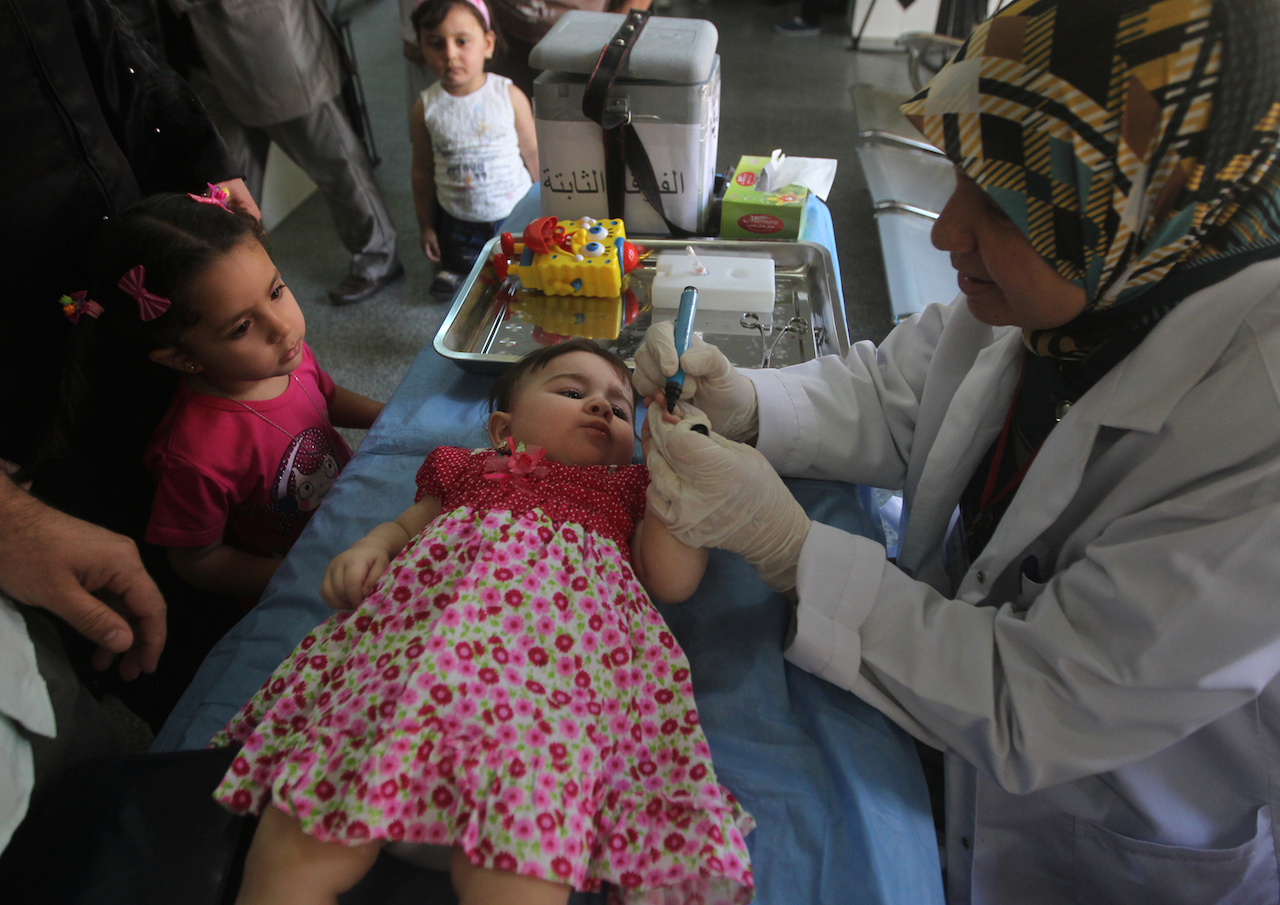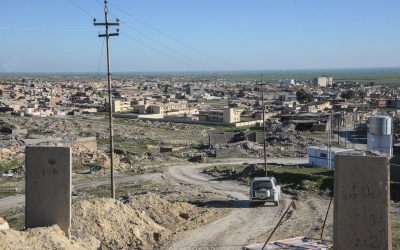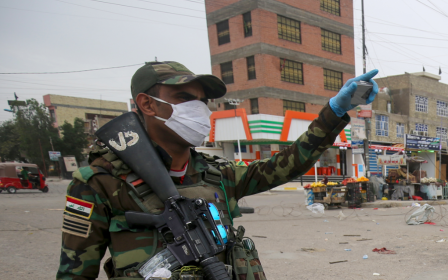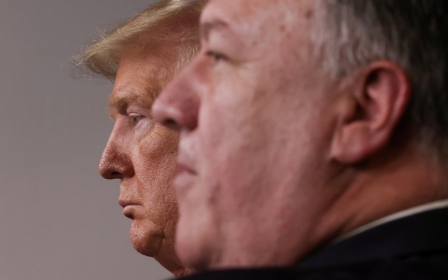Coronavirus: Iraq's doctors fear children at risk of treatable diseases amid lockdown
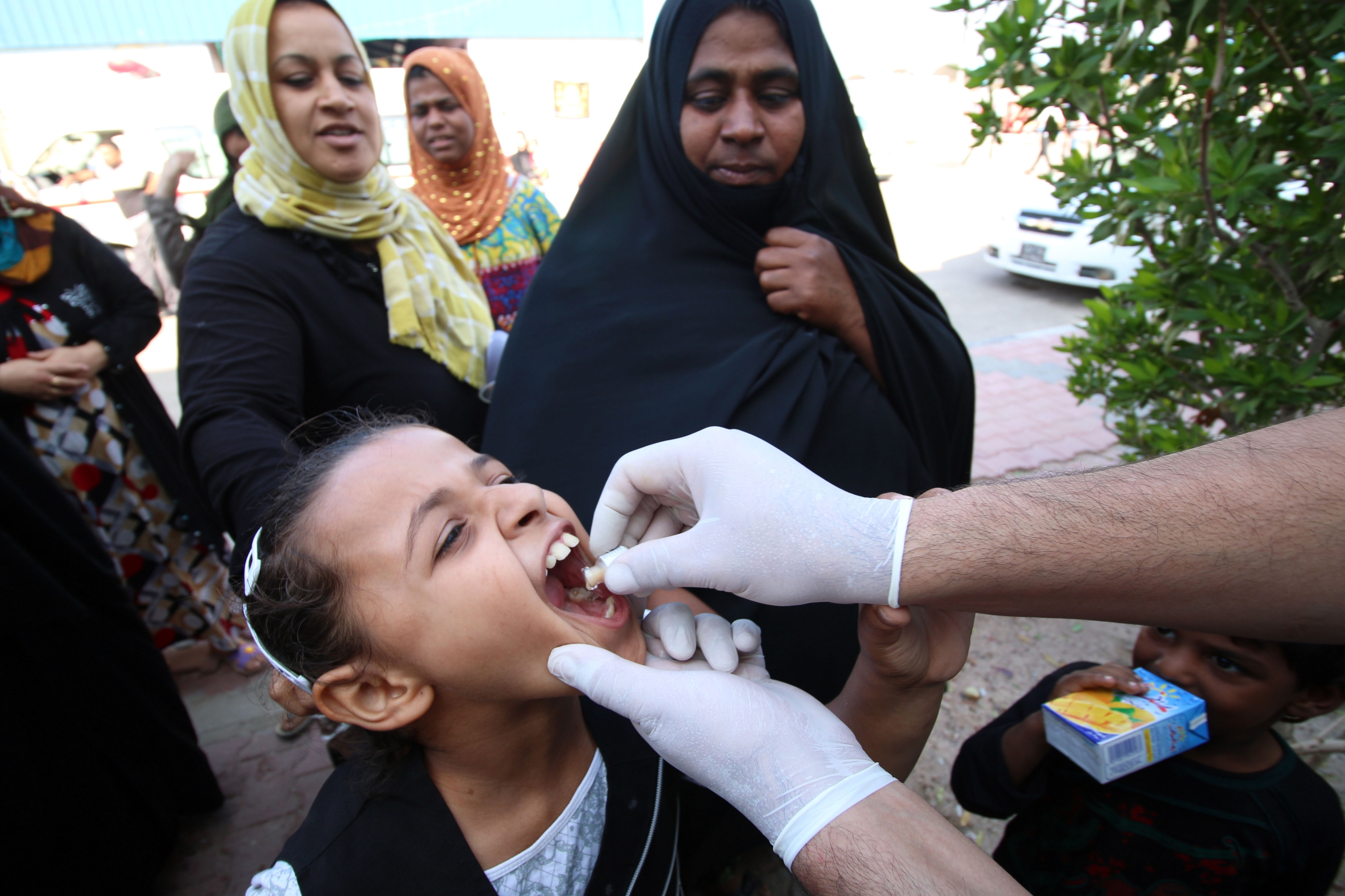
Iraq faces a resurgence of treatable diseases as a result of a lack of access to vaccines provoked by the coronavirus pandemic, health workers and campaigners have warned.
New measures imposed by the government to tackle the disease, combined with a lack of resources in Iraq's already stretched healthcare system, mean that children are missing out on vaccinations for diseases like rotavirus and influenza.
As of Tuesday, Iraq had 1,574 cases of Covid-19, with 82 deaths and 1,043 patients reported to have recovered from the virus.
There have been reports questioning official statistics provided by the government, however, which suggest there could be thousands more cases in the country, a situation not uncommon in other parts of the world.
Iraq's government announced last week that it would be extending a nationwide curfew until the beginning of Ramadan (either Thursday or Friday) - but the focus on coronavirus means that other potentially more deadly health risks could emerge.
New MEE newsletter: Jerusalem Dispatch
Sign up to get the latest insights and analysis on Israel-Palestine, alongside Turkey Unpacked and other MEE newsletters
'Risk of outbreak'
A doctor based in the southern Maysan province, who did not want to be identified, said she had travelled to Baghdad on 20 March so that her four-month old daughter could receive a round of standard inoculations, but was told that there were no vaccines available at the hospital she visited.
“After that, I contacted a number of my colleagues to ask about the vaccine in other centres," she told Middle East Eye.
'The shortage of [meningitis] vaccine could lead to a risk of outbreak. It's very important'
- Iraqi doctor
She explained that due to a general shortage of vaccines across Iraq's creaking healthcare system, it was common practice for health centres not to open vaccine kits - which are often provided by agencies such as Unicef - unless there were more than five children waiting for a vaccination, so as not to risk wasting the materials.
As a result, she said, her baby had missed five vaccination appointments.
The doctor told MEE that parents were afraid of travelling to health centres because they were feared contracting the Covid-19 virus, while some health centres were working at 50 percent capacity, or were completely closed, as staff in smaller ones were moved to primary care centres.
She warned that the current outbreak was limiting the distribution of the pneumococcal vaccine, which is used against meningitis and pneumonia.
“The shortage of this vaccine could lead to a risk of outbreak. It's very important," she explained.
Lack of guidance
According to Unicef, in Iraq only half of children aged 12-23 months are fully immunised to protect against deadly diseases such as polio and measles.
Zeina Awad, chief of communications at Unicef Iraq, said the children most at risk were often from the poorest communities in Iraq’s southern governorates such as Basra, as well as those affected by conflict or forced from their homes.
"If these children get sick, they are at risk of the severest health consequences, and least likely to access lifesaving treatment and care," she told MEE.
Battered by decades of war and sanctions, Iraq's healthcare system was already feeling the strain before coronavirus hit.
But the added weight of the virus has pushed some services to breaking point.
Khitam al-Khaykanee, managing director of the Global Jothoor Foundation, a US-based charity, said parts of the country had been going for weeks without child vaccinations taking place.
Based on discussions with mothers and healthcare workers across Iraq, Khaykanee said that with so many medical centres closed, many parents were at a loss for where to go for vaccinations.
"[The government] did not provide an alternative and did not provide reliable information where the families can go to find the needed vaccines," she told MEE.
“When we talked to some doctors they said: ‘We did not have guidance on how to deliver vaccines without further spreading coronavirus.’”
Khaykanee said that apart from moving to reopen the health centres - something that has already been promised by the health ministry - the government needed to move towards home visits for administering vaccines.
She said authorities should also facilitate safe access to hospitals and health centres during the curfew through designated safe roads for communities to use during it, similar to the ones allowed during elections and religious visits.
Khaykanee said there also needed to be much more easily available public information on how to access vaccination centres.
“For the time being, everyone is very much overwhelmed by Covid-19 - but these are as serious as Covid-19," she pointed out.
MEE contacted the Ministry of Health for comment, but had received no response at time of publication.
Healthcare crisis
Iraq's healthcare spending - at around $153 per capita annually - is less than half that of neighbouring Iran, which has itself been severely struggling to contain the crisis, while according to the World Health Organisation (WHO), there are just 8.2 doctors for every 10,000 people in Iraq.
According to figures compiled by the health ministry in 2018, Iraq had 799 intensive care beds, far less per capita than countries in Europe such as the United Kingdom and Italy, who have already seen their healthcare systems straining.
The WHO has estimated there are, in general, 14 hospital beds in Iraq for every 10,000 people. The organisation's recommended standard is 50 per 10,000 people.
“There is always a problem of medical materials," admitted the Maysan-based doctor.
Government formation
Iraq's government has been in a state of limbo since December 2019, when then Prime Minister Adel Abdul Mahdi was forced to resign by mass anti-government protests.
Since then there have been two unsuccessful attempts by prime ministerial nominees to form governments, both scuppered by political in-fighting.
The current nominee, former intelligence chief Mustafa al-Kazimi, has been given 30 days from 9 April to form a government that can be successfully passed by the fractious parliament.
Some have suggested the lack of a permanent government, and the continued negotiations to form one, have hampered some of the efforts at combating the coronavirus and putting in place provisions for healthcare workers.
One doctor, Ghaith Ghaffari, told MEE that there had been a breakdown in communications between different departments, which had caused problems for him and his colleagues.
Ghaffari said that as healthcare providers, they were exempt from the coronavirus curfew, but that they had been frequently stopped and denied access at checkpoints by security forces.
"We tried to reach a government official to talk about it, but we didn't really find anyone, and when we talked to the minister of health he said ‘there isn’t even a prime minister,'" he explained.
"He [the minister of health] said when he tried to talk to the Ministry of Interior about it, he didn’t respond either."
Despite concerns around the official figures, the Iraqi government has hailed its own efforts in fighting the coronavirus.
Curfew loosened
On Monday, the government announced a loosening of the curfew, as well as allowing some businesses to reopen.
But with global health officials already beginning to show concerns about the halting of vaccination programmes, including for supposedly defeated illnesses like polio, as a result of the pandemic, the Iraqi government could end up with new crises on its hands.
"In some countries, there may be temporary interruptions of routine services, which is why we are asking that governments begin rigorous planning now to intensify immunisation activities once the Covid-19 pandemic is under control," said Awad.
"These vaccination activities must focus on children who will miss vaccine doses during this period of interruption and prioritise the poorest and most vulnerable children."
Middle East Eye delivers independent and unrivalled coverage and analysis of the Middle East, North Africa and beyond. To learn more about republishing this content and the associated fees, please fill out this form. More about MEE can be found here.


